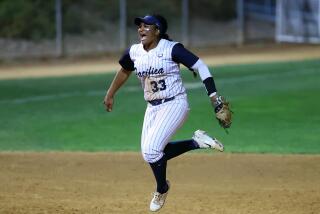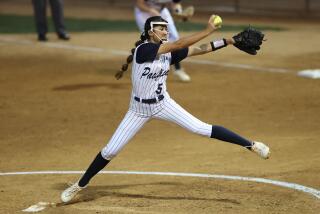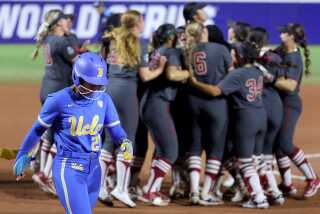Sun Shining on Granger Again : Softball: Injuries have disrupted Michele Granger’s college career at Cal, but the former Valencia High standout is winning once more.
- Share via
BERKELEY — On a sun-splashed spring afternoon at Strawberry Field in the hills above the California campus, two deer bound along just beyond the right-field fence of the school’s softball diamond.
Michele Granger would surely notice the animals if she would only turn around.
As it is, she is trying to regain the form that carried her to national high school pitching records, stardom in the 1987 Pan Am Games and distinction as the world’s finest women’s softball pitcher.
All that is in the past. A mysterious hand injury has set her back, and she is only now beginning to regain the brilliant touches to her game after a 10-month layoff.
On this day, she is stationed behind a set of bleachers, slinging a softball at speeds up to 65 miles per hour as only a few pitchers can.
Granger’s left arm whips a long circle, releasing the ball to find the catcher’s mitt with a resounding whomp an eye-blink later.
She walks a step or two to get the ball back, then paces behind the bullpen mound. Between pitches, she sips from a cup of water or listens to advice from her husband, John Poulos.
She has pitched well lately, winning nine of her past 11 games. But a new problem has surfaced.
Stiffness in her shoulder forced her to leave after three innings in Cal’s 2-1 victory over Iowa two weeks ago.
“The first time I’ve ever had to leave a game,” Granger said.
Her shoulder is bothering her again, but she gets through an hour-long pitching session with a smile.
The shoulder stiffness is only part of a greater injury. Swelling in her hand, at first believed to be the result of a cyst in her index finger, has plagued Granger since she graduated from Valencia High School in 1988.
It forced Granger to redshirt her first season at Cal after struggling through four games.
The injury has persisted this season, though it seems to be getting better. Long hours of therapy and a new split-fingered grip on the ball have helped eased the swelling.
But the new grip appears to be the cause of the recent stiffness.
Some days are better than others, she reports. This one wasn’t too bad, all things considered.
“Hey, did you see the deer?” Granger is asked.
“No,” she says. “I wish someone would have told me. They’re here a lot. The other day there were five on the hill. How many did you say there were?”
Even immersed in her recovery, Granger seems to have time to notice there’s a world out there beyond the comfortable confines of the Cal softball field.
Perhaps that, and not the ability to throw a softball past a batter, is her greatest gift.
“Yes,” she will say once practice has ended, “it is a beautiful day.”
Michele Granger is talking, which, next to striking out batters, she seems to like best.
“He wouldn’t go out with me until I graduated from high school,” she says, nodding toward Poulos, a 25-year-old law student at Cal. “That would have been too embarrassing.”
She laughes. He shakes his head as if he has heard this all before.
The two were introduced by a mutual friend when Granger was a senior at Valencia and Poulos was attending Claremont-McKenna College.
Their courtship endured a difficult year when Poulos was beginning law school at the University of Arizona and Granger was in her first year at Cal.
But Poulos transferred to Berkeley in the fall and the two were married during Christmas break.
Both agree life at their downtown Berkeley apartment is blissful, though hectic.
College has proved to be as difficult as high school was easy, Granger says. And yet she manages.
“To be married, to be a sophomore, to be at Cal, to be on the softball team, to be the No. 1 pitcher in the world,” Cal Coach Diane Ninemire says, “There’s a lot to fit into the day. That’s a lot for a normal college student.”
Granger wanted to come to Cal more for its high academic standards than its fine softball team.
Though the Bears are eighth-ranked nationally, they are a step below UCLA and Cal State Fullerton.
She is interested in a career in broadcasting and wants to attend Cal’s highly respected graduate program in mass communications.
Granger has said repeatedly that she will not continue to play softball when her college career is over. There is no future in it, no million-dollar contracts and no softball in the Olympic Games.
Granger had hoped to play in the Olympics, but the sport was not adopted for the 1992 Games in Barcelona, Spain.
So, once the final out of her senior season is recorded sometime in 1994, that will be the end. There are other worlds waiting to be conquered.
“I have a hard time believing my best attribute would be my arm,” Granger said. “I haven’t found what it is yet. Once I turn my attention to something else, we’ll see what it is.”
It’s almost as if Granger stumbled upon softball stardom by accident.
She followed the route of other accomplished players before her, albeit at an accelerated pace.
Granger was a four-time Southern Section player of the year. She was the American Softball Assn. player of the year from 1986-88 and the ASA’s nominee for the Sullivan Award those years. She was inducted into the Amateur Athletes Hall of Fame in 1986.
Once, while in high school, she struck out all 21 batters she faced. Twice, she pitched three no-hitters in a week. Her career earned-run average in four seasons at Valencia was 0.09.
As the honors and records grew to staggering heights, Granger stayed the same well-rounded person she’d always been.
“My guess is that if Michele didn’t throw a softball as fast as she did, she wouldn’t have done it ever again,” says Mike Granger, her father and her first coach.
Michele ponders this a moment and agrees. Speed is indeed a gift.
“Yup,” she says, “I was born with an arm.”
At the moment, Granger’s left arm is under siege as she lies on an examining table in the Cal training room.
An enormous ice pack, the type a major league baseball pitcher might wear, rests on her left shoulder.
She is wired to a machine that sends low-level electrical impulses into the body.
“Every tournament we go to some guy comes up to us and wants to do acupuncture,” Poulos says.
Granger winces. She hates needles, doctors, dentists, trainers. “I can’t stand pain,” she says.
“I’d never gotten hurt. I always had a squeaky-clean record.”
Until the swelling began in her left hand, that is.
Doctors removed the cyst from her index finger, figuring that was to blame. After a short recovery period, Granger was back pitching. So, in short order, was the swelling, worse than ever.
After the fourth game of her freshman season at Cal, Granger could no longer pitch effectively.
The only cure was therapy and rest, doctors told her.
From February to early November, 1989, Granger rested. The swelling was not as severe as before and she was able to begin throwing again.
But it has been a long struggle to recapture her blinding speed.
Even now, with a 15-7 record, a Pac-10-leading 222 strikeouts and an 0.42 ERA, she frets over her statistics.
“I’m still not that great,” she says. “I’m still not throwing that well. I’m not as fast.”
Once timed at an astounding 72 m.p.h., Granger says she struggles to hit the low 60s some days.
Often, it’s more than enough to subdue opponents.
“Michele could throw at 60% and be just as good as the top pitchers,” Ninemire says.
Granger is talking again. The ordeal in the training room is over and Granger has a chance to reflect on her sport.
“It wouldn’t be any fun if you couldn’t strike people out,” she says. “I would get bored if I played any other position. My mind wanders as it is.”
Indeed, Ninemire says Granger has one request of her infielders:
Tell jokes.
“It makes me laugh,” Granger says. “It’s got to be fun. You might as well have fun. You’re not making millions of dollars doing this.”
She continues after a pause.
“You have good days, and there’s no getting upset on bad days. In the long run, no one is going to remember. There’s always another game. There’s a saying, ‘You’re only as good as your last game.’
“There is more to life than softball.”
Granger mulls this over, staring down at cars and foot traffic on the street.
The sun is beginning to sink toward the horizon, the city turns a golden hue as the temperature drops.
Yes, late on a sunny afternoon in the middle of spring looks pretty good from where Michele Granger stands.
More to Read
Go beyond the scoreboard
Get the latest on L.A.'s teams in the daily Sports Report newsletter.
You may occasionally receive promotional content from the Los Angeles Times.










